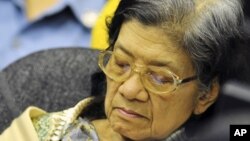WASHINGTON DC - While the release Sunday of former Khmer Rouge leader Ieng Thirith upset some victims of the regime, it was also a call for the UN to continue support and hasten the work of the court, observers say.
Ieng Thirith, 80, was found mentally unfit to participate in her own defense, and released under supervision of her family in Phnom Penh on Sunday.
Her husband, former foreign minister Ieng Sary, 86, who has been hospitalized since Sept. 7, told the court Tuesday he needed a break from hearings.
Chhang Youk, head of the Documentation Center of Cambodia, said Ieng Thirith’s release was a reminder of the need for speedy trials, as the aging leaders currently in detention face increased health risks and the prospect of escaping justice.
“This is a message to the UN not to continue delaying the process of finding justice in Cambodia,” he said.
The court is currently facing extreme financial woes, in the midst of the atrocity crimes trial of Nuon Chea, Khieu Samphan and Ieng Sary. Ieng Thirith, who still faces charges, could be retried if she is found fit to take part in her own defense.
Chhang Youk said her release was not unexpected and was a step forward in Cambodia’s long road to healing. But it will be hard for some Cambodians to understand the medical care she has received from the tribunal along the way, which “the average Cambodian cannot even afford,” he said.
Some victims, like Khmer Rouge survivor Chum Mey, were angered by the release order, which came down from the court last week and was enacted on Sunday.
“This is not reasonable,” he said. “It’s unfair. She’s simply feigning [illness]. Ieng Thirith’s release will prompt others to seek their release as well.”
There were no official statements from the government on Ieng Thirith’s release. Top officials have faced ongoing criticism of interference in the court’s work, but government spokesman Phay Siphan said the release was “merely a court procedure.”
For the tribunal, Ieng Thirith’s release will mean another round of public outreach, as it tries to explain the processes of the court and the medical examinations that led to the decision.
“Based on human rights and international law, the court cannot continue to detain accused [persons] like Ieng Thirith, who is suffering from dementia,” tribunal spokesman Neth Pheaktra said.
Ieng Thirith, 80, was found mentally unfit to participate in her own defense, and released under supervision of her family in Phnom Penh on Sunday.
Her husband, former foreign minister Ieng Sary, 86, who has been hospitalized since Sept. 7, told the court Tuesday he needed a break from hearings.
Chhang Youk, head of the Documentation Center of Cambodia, said Ieng Thirith’s release was a reminder of the need for speedy trials, as the aging leaders currently in detention face increased health risks and the prospect of escaping justice.
“This is a message to the UN not to continue delaying the process of finding justice in Cambodia,” he said.
The court is currently facing extreme financial woes, in the midst of the atrocity crimes trial of Nuon Chea, Khieu Samphan and Ieng Sary. Ieng Thirith, who still faces charges, could be retried if she is found fit to take part in her own defense.
Chhang Youk said her release was not unexpected and was a step forward in Cambodia’s long road to healing. But it will be hard for some Cambodians to understand the medical care she has received from the tribunal along the way, which “the average Cambodian cannot even afford,” he said.
Some victims, like Khmer Rouge survivor Chum Mey, were angered by the release order, which came down from the court last week and was enacted on Sunday.
“This is not reasonable,” he said. “It’s unfair. She’s simply feigning [illness]. Ieng Thirith’s release will prompt others to seek their release as well.”
There were no official statements from the government on Ieng Thirith’s release. Top officials have faced ongoing criticism of interference in the court’s work, but government spokesman Phay Siphan said the release was “merely a court procedure.”
For the tribunal, Ieng Thirith’s release will mean another round of public outreach, as it tries to explain the processes of the court and the medical examinations that led to the decision.
“Based on human rights and international law, the court cannot continue to detain accused [persons] like Ieng Thirith, who is suffering from dementia,” tribunal spokesman Neth Pheaktra said.




